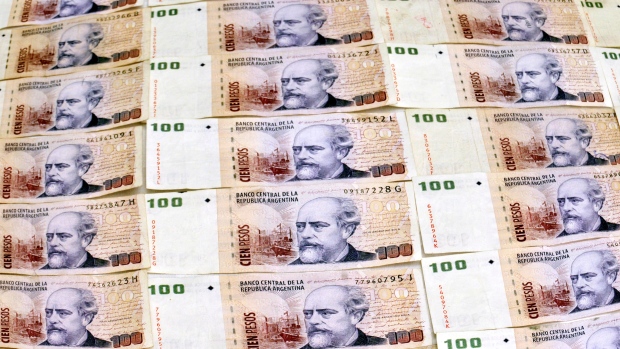Aug 30, 2018
Argentina peso rout worsens as record rate hike brings no relief
, Bloomberg News

Argentina’s currency crisis intensified on Thursday as the peso plunged 20 per cent in a rout that only accelerated after the central bank tried to shore up confidence with an emergency increase in interest rates.
The bank raised its benchmark measure to a global high of 60 per cent, the latest attempt by policy makers to defend a currency that’s lost more than half its value this year. A day earlier, President Mauricio Macri shocked the country with an appeal for quicker payouts from the International Monetary Fund, which said it’s considering the request.
Argentina is crashing back into the kind of financial turmoil that Macri’s market-friendly government had supposedly left behind. Investors are running out of faith that the president, who came to power in December 2015 after more than a decade of budget-busting populism, can shore up the economy and bring Argentina’s fiscal and trade deficits, and its inflation rate, to manageable levels.
Macri had promised a smooth, gradual fix. That option may be disappearing.
“The market isn’t giving them a choice,’’ said Edwin Gutierrez, the London-based head of emerging-market sovereign debt at Aberdeen Standard Investments. “It’s forcing them to get it over with.’’
The unfolding crisis in Argentina sent tremors through other emerging markets, already shaken last month by a similar -- and ongoing -- crash in Turkey. The lira fell 4.4 percent on Thursday, and currencies from Mexico to South Africa also posted losses. Brazil’s central bank intervened to shore up the real with additional swap auctions.
Argentina had some defenses in place, after securing the biggest IMF loan in history, a US$50 billion credit package agreed in June. The country also has relatively low levels of foreign-currency debt, after enduring more than a decade virtually shut out of global finance.
But it’s returned to the markets at a rapid clip under Macri, adding more than US$50 billion of dollar debt in two years.
Inflation has stuck above 30 per cent and is set to accelerate after the peso slump. The government had aimed to reduce the overall budget deficit to 5.1 per cent of GDP this year, from 6.5 per cent. It’s already forecasting an economic contraction this year of 1 per cent, a sharp deterioration from the 3 per cent growth that was predicted at the start of this year.
Argentina is headed for a “hard landing recession” in the next 12 months that will put Macri under pressure as he seeks re-election in October 2019, Paul Greer, a money manager at Fidelity International in London, wrote in an email. The current backdrop for emerging markets is “unforgiving,” he said.
Macri’s Treasury minister, Nicolas Dujovne, told reporters late Wednesday that the government is working on a plan to chop its fiscal deficit more rapidly so that it can reduce borrowing. No details were provided.
The Fund says it’s weighing Macri’s surprise request, made in a televised address to the country on Wednesday, for disbursements to be speeded up.
"They said this IMF agreement will be ready in a few weeks,’’ said Aberdeen’s Gutierrez. “Do they have a few weeks? I’m not sure they do."